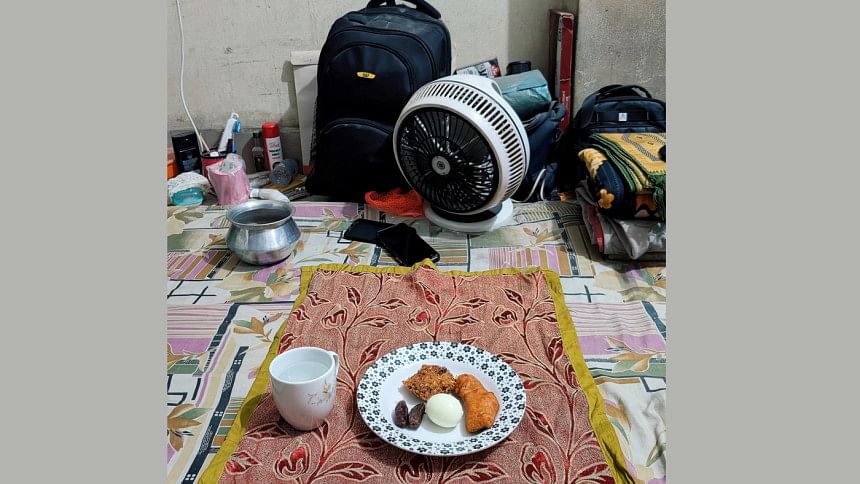Ramadan in the city: Stories of those missing home

I have read somewhere that the best part of iftar is sharing the moment with your family, although not everyone is lucky enough to spend the month of Ramadan with loved ones.
Dhaka, being the capital, attracts people from all walks of life, in search of better opportunities. They come here to work hard to provide for their families. Many students leave their homes with heavy hearts, carrying the hope of a brighter future. But as they walk the crowded streets, a part of them always stays behind.
During Ramadan, that emptiness is felt even more. As the call for iftar or sehriechoes in the air, there's a quiet ache in the hearts of those far from family. The food may fill the stomach, but it's always the love and the warmth of family that truly nourishes the soul.
Anower Hossain, a private job holder, shares, "It's hard being away from home. I think about my two-year-old daughter a lot. She is too young to understand why I'm not there with her."
When asked what he usually eats at iftar or sehri, Hossain replies, "Every day, for sehri, I just heat the curries I brought from Sirajganj, my hometown.My mother made the dishes for me. The hardest part of the day is when I sit down to eat and realise how much I miss my family."
"Iftar is just... whatever I can find at the shop—alu chop, beguni, piyaju, and sometimes, jilapi. I brought jaggery from my home, which I use to make the sharbat," he adds.
Md Hasinur Rahman, a 19-year-old from Dinajpur, came to Dhaka in search of better opportunities, and found work as a food delivery rider. "I thought I'd make it big, but right now, I'm just trying to survive," he shares.
At iftar, he goes to nearby mosques, and for sehri, he eats with his fellow riders. "It's just food from nearby hotels — tasteless, but okay. Nothing compares to my mother's cooking," he adds.
I found Abul Bashar, aged 65, taking a break after long hours of duty. He works as a security guard at a market in Banani.
"I miss my wife so much, especially her cooking," he shares. "Here, I live with my son, but he's always busy at the cosmetic shop he works at. I work till 10 PM, so we hardly see each other."
When asked about his plans for Eid, he sighs, "We don't get holidays often. After 10 days, we get a short leave, but it's barely enough."

Musfikul Islam Rasel, a student living in a mess, expresses that he misses his own cooking.
Rasel explains, "I still remember how my mother taught me to cook. In Ramadan, she'd stand beside me, guiding me as I prepared the iftar. It was always like festivals at home. I'd experiment with different recipes, and my elder sister would make the sharbat. Now, here in the mess, I've lost the energy for it. I just make one simple dish for sehri, and that's it, and for iftar, I just get through it with friends or at university events."
"I miss my home, the joy of cooking together, the laughter in the kitchen. I miss my father's voice calling me for sehri. It's just not the same anymore," Rasel adds.
Sabbir Hossain Shisir, a BUET student staying in the hall, recalls, "When I first came, there were no familiar faces. For iftar, we'd sit on a mat in our small room, four people at each corner. But we got through it.
Sehri became easier with the hospitality of the staff at the dining — they'd wake us up with a bell and serve us food. That's when it started to feel like home."
"With around 450 people in our hall, Ramadan feels like a festival every day. Some days, we organise the iftar, some days it's the seniors, and other times, it's our floor or our department. Everyone is welcome anywhere — as some have iftar on the rooftop, some by the fountain, in the field, or at the mosque. Sometimes, we spend the whole night chatting, and before we know it, it's time for sehri," he shares.
When asked what he misses, Shisir adds, "Being able to ask my mother to make different items. I can't do that anymore. When I used to tutor, the first thing I'd do at iftar time was to look for a shop after getting off the bus. My mother would always be so sad to hear that. I always miss my family, but now, it's another family that has sort of filled that gap."
In the heart of Dhaka, despite its endless opportunities, we are reminded of whatmatters the most — the family we miss, and the home we carry within us.
Photo: Jawwad Sami Neogi

 For all latest news, follow The Daily Star's Google News channel.
For all latest news, follow The Daily Star's Google News channel. 



Comments